What's new

Call for new Board members closes August 12
Don't miss this opportunity to play a part in the governance of the Institute for Work & Health. The Institute's Board of Directors is looking for new members. Please help us spread the word by forwarding this call for members to qualified individuals. Submissions are accepted until Friday, August 12.

Grant round-up: Exploring the impact of AI, recovery and work after COVID, and more
Upcoming research at IWH is tackling important work and health issues, from COVID-19 return-to-work and recovery outcomes to the impact of artificial intelligence on worker inequities. The latest Grant Round-up article offers a snapshot of new research being undertaken at the Institute, thanks to external grant awards.

How daily movement patterns are linked to heart health of workers
How much physical activity do Canadian workers actually do in a day, and when? And what patterns of movement are associated with lower risks of cardiovascular disease? An Institute for Work & Health (IWH) study drew on activity tracker data to answer these questions. It found that people who were sedentary—i.e. who did little physical activity throughout the day—had the highest risk of heart disease compared to most other groups. No surprise there. What is surprising, however, was how their heart health risk compared with those who did vigorous, tiring work all day.

Return-to-work communication: workplace stakeholders share their strategies
Communication is central to disability management, especially in large and complex organizations where communication challenges can be exacerbated by the involvement of multiple parties and inconsistent practices. An IWH research team set out to better understand the strategies used by workplace stakeholders to effectively communicate return-to-work (RTW) issues. Their insights are now summed up in the latest Research Highlights.

New review sums up sex/gender differences in work injury and illness outcomes
Men and women may be part of the labour force in roughly equal proportions. But many jobs and industries are still dominated by one sex/gender or another. In that light, a new systematic review at IWH looks at how work exposures and injury/illness outcomes are different for men and women.

Widely used survey unable to isolate specific psychosocial work dimensions
Guarding Minds @ Work is a widely used survey designed to measure 13 psychosocial dimensions of the work environment that have the potential to affect worker mental health. However, a joint study by the Institute for Work & Health and Occupational Health Clinics for Ontario Workers finds the survey unable to measure each of the 13 dimensions in isolation. This has implications for workplaces that use the measure to assess how well they are doing on specific psychosocial dimensions, such as workforce civility and respect, workload management and more, says the research team.

New policy briefing: estimating the ROI of OHS spending
What’s the return-on-investment (ROI) for every dollar employers spend on occupational health and safety? A team at IWH has come up with an estimate for three Ontario sectors—manufacturing, construction and transportation—based on previous research and on Workplace Safety and Insurance Board data.
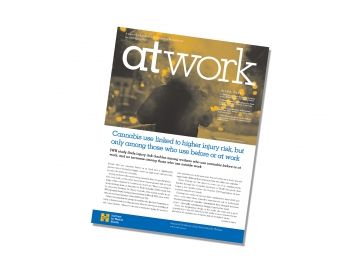
The Spring issue of At Work is out!
In this issue:
Higher injury risk linked to cannabis use at or before work, but not to cannabis use off-work
How government funding can best support the employment of persons with disabilities
Widely used survey lacks ability to distinctly measure the 13 factors of the psychosocial work environment
And more....

What research can do: IWH input contributes to enhancement of WSIB’s Health and Safety Index
When Ontario’s Workplace Safety and Insurance Board reviewed its Health and Safety Index, an indicator of the health and safety of Ontario’s workplaces, IWH researchers provided advice on index methodology. This column summarizes how enhancements to the index incorporated that advice.
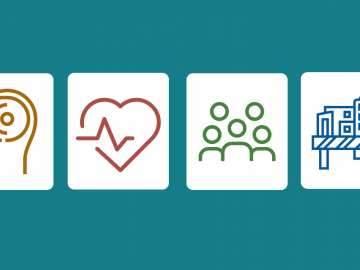
IWH team wins inclusive design competition for job accommodation and support tool
A team led by Institute for Work & Health (IWH) Senior Scientist Dr. Monique Gignac has been announced first place winner in a competition called Inclusive Design Challenge: Support at Work. The competition, the second of the MaRS Innovation Challenges series and co-sponsored by CIBC, is aimed at finding solutions that improve support at work for persons with disabilities.
The ACED project team (short for Accommodating and Communicating about Episodic Disabilities) won the competition for its Job Demands and Accommodation Planning Tool. It's designed to help people think about the workplace supports they need when they live with a chronic health condition that can cause challenges. Recruiting is underway to test the tool.
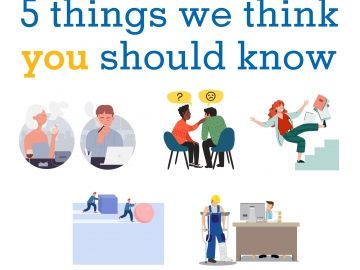
5 things we think you should know in 2022
Five practical messages you can take away from IWH research over the past year. That’s the idea behind our annual handout, 5 Things We Think You Should Know, created especially for occupational health and safety practitioners and stakeholders. Find out what the 2022 messages are.
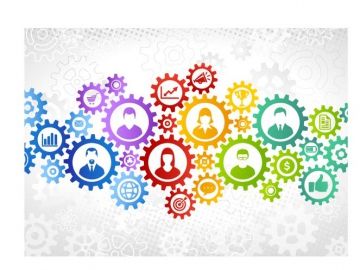
IWH now hiring for Director, Strategic Relations
The Institute is looking for a Director, Strategic Relations. This individual will work with IWH’s executive team to amplify the Institute’s provincial, national and international presence, broaden research audiences, and promote diversity among research and stakeholder groups. The individual will also identify opportunities for IWH expertise to contribute to the development of policies, programs and resources at the provincial and federal levels—and particularly within Ontario’s prevention system.

Poor interaction with case managers raises risk of distress, Ontario study finds
Injured workers who report having poor interactions with case managers during the workers’ compensation claims process face a higher risk of developing serious or elevated psychological distress later on. That’s according to a recent IWH study that followed a group of Ontario claimants 18 months after their injury.

WSIB Health & Safety Excellence Program makes use of IWH safety culture measure
A version of the IWH-Organizational Performance Metric (IWH-OPM) is used by Ontario’s Workplace Safety and Insurance Board (WSIB) to let workplaces in its Health and Safety Excellence Program measure their safety culture against a benchmark. The measure also allows the compensation agency to track trends in safety culture over time among participating organizations.
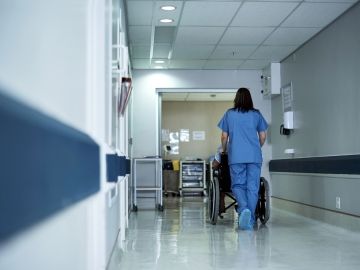
Participatory ergonomics a sustainable OHS approach in long-term care
Frontline workers know better than anyone what musculoskeletal (MSD) hazards they encounter on the job—and how to solve them. Participatory ergonomics
is an occupational health and safety (OHS) approach that puts worker involvement front and centre. An IWH study led by Scientist Dr. Dwayne Van Eerd found this approach can be successfully implemented and sustained—even in busy long-term care facilities challenged by staff shortages and high turnover.
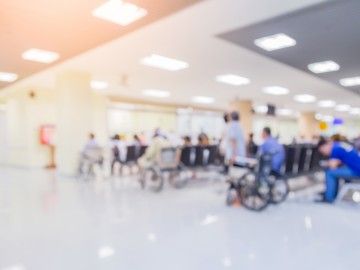
IWH links ER and workers’ comp claims data, finds important patterns in under-reporting
Over a third of work-related injuries and illnesses treated in Ontario hospital emergency rooms (ERs) don’t get reported as Workplace Safety and Insurance Board (WSIB) claims. That’s according to a recent Institute for Work & Health (IWH) data linkage study that found notable patterns in work-related injury reporting and under-reporting—including a change in reporting levels following the 2008/09 global financial crisis.

Registration now open for Spring 2022 session of Project ECHO OEM
Are you an Ontario primary health-care provider who treats or supports patients with injuries and illnesses that affect their ability to work? Project ECHO OEM is a telementoring program on occupational and environmental medicine set up just for you. Learn about best practices to better support patients in recovery and return to work or stay at work. Sessions are held via videoconference each Friday from April 22 to July 15, 2022. Registration is ongoing.

Participants needed to pilot-test a work support and accommodation planning tool
A research team at the Institute has developed a workplace support and accommodation planning tool for workers living with a chronic, episodic health condition. It’s designed to help workers think about the self-management strategies and workplace supports they need. The Job Demands and Accommodation Planning Tool is now ready to be pilot-tested in an evaluation study. If you work in Canada and are looking for support in managing your chronic, episodic health condition, you can help the team test the tool.
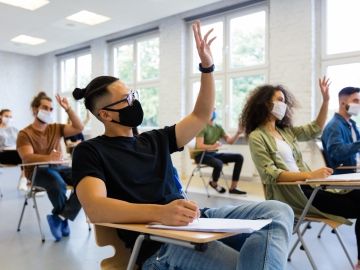
Syme Research Training Awards now open for applications
The Institute for Work & Health (IWH) is now accepting applications for its 12-month S. Leonard Syme Research Training Awards in Work and Health.
The awards are for young researchers at the master's or doctoral level intending to study work and health. Preference is given to candidates whose research interests closely align with IWH's current research and topic areas. IWH is particularly interested in candidates whose research addresses the prevention of work-related injury and illness, and the prevention and management of disability at work in Ontario. In the spirit of Dr. Syme's own contributions to research mentorship, candidates from any disciplinary background are eligible for training awards. A maximum of three smaller awards or one larger award may be offered. Awards are based on the merit of the research proposed.
The registration deadline for applications is April 29, 2022. Enquiries should be directed to Lyudmila Mansurova: lmansurova@iwh.on.ca.

What research can do: IWH safety culture tool used in WSIB’s Health and Safety Excellence program
A version of the IWH-Organizational Performance Metric (IWH-OPM) is used by Ontario’s Workplace Safety and Insurance Board (WSIB) to let workplaces in its Health and Safety Excellence Program measure their safety culture against a benchmark. The measure also allows the compensation agency to track trends in safety culture over time among participating organizations.

IWH Updates - Winter 2022
IWH researcher wins new WorkSafeBC postdoctoral award ~ IWH 2020-21 annual report now available ~ Participants needed to pilot-test a work support and accommodation planning tool ~ Registration now open for the Spring 2022 session of Project ECHO OEM

IWH study finds psychosocial work factors lead to burnout, not other way around
Studies to date have repeatedly shown a link between poor psychosocial work conditions and burnout. Some have also shown the link to potentially be a causal one. But if work can cause burnout, might burnout influence a person’s relationship to work? A new IWH study recently explored this question.

Q&A with new IWH president on how he got here and what he has planned for the years ahead
Almost 22 years ago, in the summer of 2000, master's student Peter Smith walked through the doors of the Institute for Work & Health for a 16-week practicum placement. Now, Dr. Peter Smith is president of the Institute, replacing Dr. Cameron Mustard, who retired in January after 20 years in the position. In a Q&A with At Work, Smith looks back at his history with the Institute and his vision for its future.

How workers and managers view workplace supports for depression
Many types of workplace practices and supports are available to help and accommodate workers with depression. But which do workers find most useful? Do their managers find the same? A study asks workers with lived experience of depression and the people who manage them, and finds rather divergent views.

Dr. Peter Smith named new IWH president
On Monday, January 17, IWH’s Dr. Peter Smith becomes the new president of IWH. Smith has been a member of IWH’s scientific staff for over 15 years, most recently serving as the Institute’s scientific co-director. He replaces Dr. Cameron Mustard, who is retiring after 20 years in the position. In a statement issued earlier this week, Kate Lamb, chair of the IWH Board of Directors, warmly thanked Mustard for his tremendous contribution
to the world of occupational health, safety and wellness. His impact as president is immeasurable, and his legacy will continue through his ongoing work with the Institute on active research projects,
wrote Lamb.